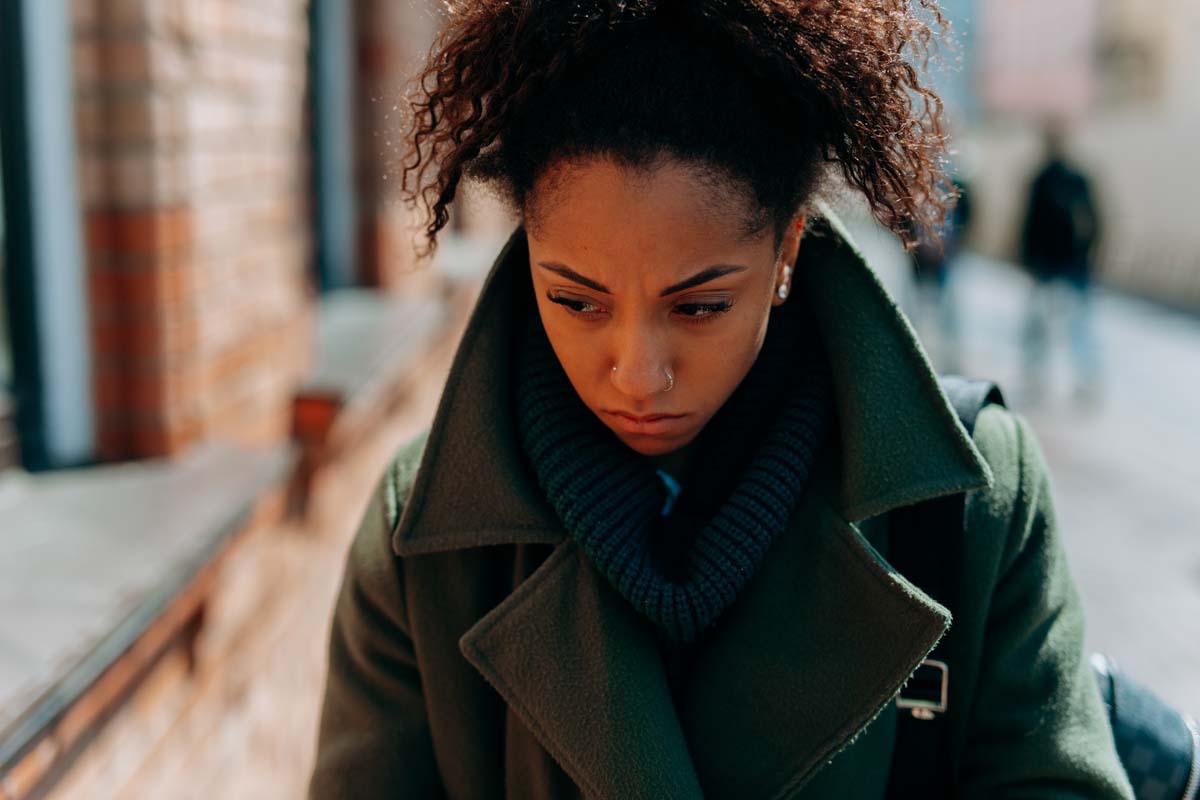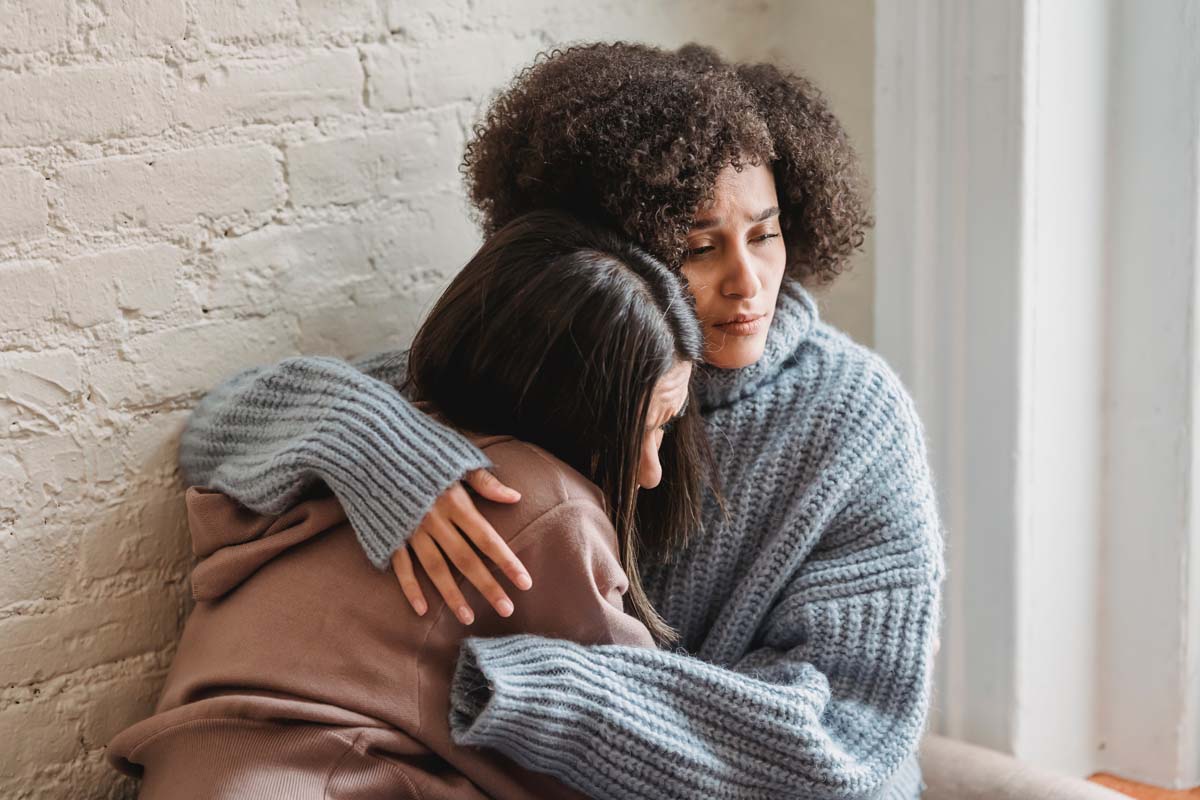The legal definition of Domestic Abuse is:
Domestic abuse involves any single incident or pattern of conduct where someone's behaviour towards another is abusive, and where the people involved are aged 16 or over and are, or have been, personally connected to each other (regardless of gender or sexuality).


Domestic Abuse can take many different forms, including physical violence, sexual violence, emotional or psychological abuse, financial / economic abuse, and harassment, stalking & digital abuse. It can involve a range of behaviours, such as intimidation, isolation, manipulation, coercion, and threats.
Whilst FearFree are clear that Domestic Abuse can happen to anyone, it remains a gendered crime, and in the majority of cases, it is experienced by women and is perpetrated by men.
Domestic Abuse is never the fault of the victim or children. Remember that help and support are available for those who are experiencing it. Click here to get in touch.
Coercive control
You may have heard about 'Coercive Control' - this is now a criminal offence in the UK. Coercive control refers to a pattern of behaviour designed to control the victim. The legal definition for coercive control is:
A purposeful pattern of behaviour which takes place over time in order for one individual to exert power, control or coercion over another".
How widespread is Domestic Abuse?
Domestic Abuse is a serious and widespread problem. Research shows us that more than one in four women across the world will experience Domestic Abuse before the age of 50. In the UK, this equates to:
- I in 5 adults will experience Domestic Abuse during their lifetime - approximately 1 in 4 women and 1 in 6-7 men.
- A Domestic Abuse related call is made to the Police every 30 seconds.
- The Police recorded 1,500,369 Domestic Abuse related incidents and crimes across England and Wales in the year ending March 2022.
- It is estimated that less than 24% of Domestic Abuse crime is reported to the Police (NCDV).
- Domestic Abuse can be fatal - approximately half of adult female homicide victims are killed as a result of Domestic Abuse (ONS).

The 2021 DA Bill recognised children as victims of Domestic Abuse in their own right for the first time - highlighting the significant impact that Domestic Abuse can have on children and young people. It is estimated that 1 in 5 children will witness or experience Domestic Abuse during their childhood. For further information about the impact of Domestic Abuse on children, please click here.
Forms of Domestic Abuse

Physical harm
Physical harm is perhaps the most recognised form of Domestic Abuse. It is important to recognise that abuse rarely starts with physical violence and a victim has often experienced a range of abusive and controlling behaviour prior to the relationship becoming violent.
Physical harm additionally includes a range of behaviours, beyond 'punching', such as the use of objects to harm someone. It can also be used to describe criminal damage behaviours, such as the destruction or property or punching a door. Examples include (but are not limited to):
- Hitting, slapping or punching.
- Pushing, pulling or shoving.
- Pinching.
- Strangulation or choking.
- Drowning.
- Hair pulling.
- Kicking.
- Criminal damage or destruction of property.
- Throwing objects.
- Use of weapons or objects to hurt the victim.
- Threatening someone with a weapon.
- Burning.
- Coercing their partner into substance abuse.
- Refusing medical care or controlling the victim's medication.
- Shaking.
- Hurting or threatening to hurt the family pets.
- Depriving you of basic needs, such as food.

Emotional and psychological abuse
The term 'emotional and psychological abuse' refers to a wide range of behaviours that a perpetrator might use to seek control over the victim.
It can be very difficult to identify emotional abuse in the early stages of this behaviour. However, if your partner is making you feel uncomfortable, or anxious or as if you need to 'walk on eggshells', this could be a sign that the relationship is not healthy.
Examples of emotional abuse include, but are not limited to:
- Name calling.
- Insulting the victim.
- Making threats to harm the victim or children.
- Isolating the victim or controlling what they do and who they see.
- Ridiculing the victim.
- Extreme jealousy.
- False accusations.
- Shaming and humiliating.
- Blaming the victim for the behaviour.
- Denying or minimising the abuse.
- Telling someone what to wear, think or do.
- Threatening the family pet.
- Using children.
- Using male privilege.
- Threatening to commit suicide.

Financial and economic abuse
Financial abuse is sometimes called economic abuse and further enables one person to control another. This form of abuse can make it more difficult for a victim to leave the relationship and allows the perpetrator to monitor the victim's movements.
Examples of this form of behaviour include (but are not limited to):
- Not allowing the victim access to money.
- Not allowing the victim to have information about the family financial situation.
- Making the victim account for every penny spent and justify any "unapproved" spending.
- Removing access to bank accounts and cards.
- Preventing the victim from working, or forcing them to work more hours than they want.
- Preventing the victim from gaining education and qualifications.
- Borrowing money and not returning it.
- Taking / stealing the victim's money.
- Pushing the victim to become involved in illegal activity.
- Forcing someone to make a change to their will, property ownership or inheritance.
- Withholding child maintenance payments.

Sexual Violence
Sexual violence or abuse can happen to anyone. Sexual abuse involves a range of behaviour, including:
- Touching someone in a way that they don't want to be touched.
- Making unwanted sexual demands.
-
- Causing pain during sex.
-
- Pressuring someone into having sex when they do not want to.
-
- Touching someone or having sex with them when they are asleep or unconscious.
-
- Pressuring someone into having sex in a way that they do not want to, including refusing to use protection.
-
- Forcing someone to have sex with other people.
-
- Enforced prostitution.
-
- Using sex as a form of currency: "you can see your parents if you have sex with me".
-
- Filming or taking intimate pictures where someone has not agreed to this.
-
- Distributing images of someone without their consent - sometimes known as 'revenge pornography'.
-
- Degrading or humiliating someone sexually.
-
- Sexual abuse is not about sex - it is about power and control. If a partner, or former partner, has sex with you when you do not want to, this is rape. You can find further information and support, click here.
-
- For more information about consent, please click here.

Harassment and Stalking
Domestic Abuse can involve a range of unwanted behaviours, including those that come under harassment and stalking legislation. This can occur both within a relationship and after the relationship has ended and involves repeated behaviour that makes a victim feel scared, distressed or threatened.
- Reading a victim's emails, texts or correspondence. This can include accessing them by illicit means and hacking.
- Demanding access to a victim's private phone or computer.
- Use of 'tracking' devices.
- Following the victim.
- Monitoring someone's location and activities.
- Demanding to know the victim's passwords.
- Sending abusive messages.
- Sending unwanted gifts.
- Repeated unwanted contact.
- Cyber stalking (using the internet to harass someone).
- Interfering with someone's property.
- Identity theft.
- Harassment via child contact.
- Continually messaging someone when they have been asked to stop.
- Encouraging or paying others to partake in stalking / harassing the victim.
- Repeated unwanted contact.
- Cyber stalking (using the internet to harass someone).
- Interfering with someone's property.
- Identity theft.
- Harassment via child contact.
- Continually messaging someone when they have been asked to stop.
- Encouraging or paying others to partake in stalking / harassing the victim.
Example behaviour includes, but is not limited to:
One way to consider if the behaviour you are experiencing constitutes stalking is to remember:
Fixated
Obsessive
Unwanted
Repeated
You can find further information about stalking and harassment click here.
The impact of Domestic Abuse
It is hard to over-state the impact of Domestic Abuse - for many victims and children, the impact will be life-long.
Domestic Abuse can affect every part of someone's life - causing physical, emotional and practical harm.

Physical injury
Physical injuries are often the first thought when considering the impact of Domestic Abuse, but it is worth remembering that there can be both short and long-term consequences. Ultimately, there is a risk of fatality from Domestic Abuse, with about seven women a month being killed by a current or ex-partner in England and Wales.
Other physical impacts include:
- Bruising, cuts and broken bones.
- Head injuries.
- Physical health conditions, such as: asthma, gastrointestinal disorders, nervous system disorders and chronic pain syndromes.
- Sexually transmitted diseases.
- Reproductive problems.
- Problems in pregnancy.
- Self-harm and suicide attempts.
- There is an increased risk of heart attacks, other serious conditions and fatality for those who have been the victim of non-fatal strangulations.
It is important to note that one fifth of children in a domestically abusive household will be injured as a result of the abuse.

Emotional impact
The emotional impact of Domestic Abuse might also be called psychological harm or the mental health impact. Alongside the immediate distress and anxiety caused by abuse, there can be long-term psychological harm.
Examples of the impact include:
- Mental health conditions, including depression and anxiety.
- Suicidal ideation, self-harm and suicide attempts.
- Increased risk of Post-Traumatic Stress Disorder (PTSD).
- Low self-esteem.
- Insomnia and sleep problems, including nightmares.
- Flashbacks.
- Panic attacks.
- Distrust in future relationships.
- Feeling unsafe.
- Intergenerational trauma.
- Phobias.

Practical harm
Practical harm refers to a range of impacts on the victim, which can affect them immediately and in the future. This includes:
- Problems maintaining employment.
- Reduced earning capacity.
- Dropping out of education or training.
- Difficulties getting an ID or bank account.
- Damage or destruction of property.
- Homelessness.
- Debt and financial problems.
- Needing to move out of the area - and away from support networks.
Recognising the signs of Domestic Abuse
It is not always easy to recognise that you are in abusive relationship, especially when the behaviour first starts.

Love bombing:
Many relationships can initially appear 'healthy' or might involve the perpetrator 'love bombing' their partner. Love bombing refers to an action or practice of lavishing (or 'bombing' ) someone with attention, affection and compliments in order to influence or manipulate them. Love bombing should be considered a red flag for Domestic Abuse.
It can be difficult to recognise love bombing, as it can feel a positive and enjoyable part of an early relationship when it happens. It is therefore important to have an awareness and understanding of it. Signs of love bombing include:
- Saying "I love you" very early in the relationship.
- Comments like "you're my soulmate" and "you complete me".
- They enjoy grand gestures and celebrate small milestones in a relationship.
- Compliments are endless - and over the top: "you're the answer to all my prayers".
- Continual messaging and an expectation that you reply quickly.
- They get irritated if you spend time with other people.
- They want to know everything about you straight away.
- They demand continual validation from you.
- Over the top and expensive gifts.
- Things just don't feel "quite right".

Domestic Abuse:
FearFree hold that anything that makes you feel uncomfortable or unsafe in a relationship is a warning sign.
If you are experiencing any of the following, then it is likely that you're being abused:
- Is your partner jealous and possessive?
- Does your partner ask to see your phone to look at who you are in contact with? They might try to justify it by saying that it's not you they're worried about, but other people.
- Do they cut you off from family and friends and try to isolate you?
- Are they charming one minute and abusive the next? Do they have sudden changes of mood - like Jekyll and Hyde?
- Do they control your life - for example, your money, who you should see, what you should wear?
- Do they monitor your movements?
- Do they blame you for the abuse?
- Do they accuse you of not being able to take a joke?
- Do they humiliate or insult you in front of others?
- Do they verbally abuse you?
- Do they constantly riticize you?
- Do they use anger and intimidation to frighten you and make you comply with their demands?
- Do they tell you that you're useless and couldn't cope without them?
- Have they threatened to hurt you or people close to you if you leave them?
- Do you change your behaviour to avoid making them angry?
- Do they force you to have sex when you don't want to?

Escalating Behaviour
Typically Domestic Abuse escalates over a period of time - it does not start with violence, but it might end in death. Whilst any relationship can be dangerous, there are a few signs that the risks are significantly increasing:
Pregnancy: The risks of Domestic Abuse increase if the victim is pregnant or has had a baby in the last twelve months.
Non-fatal strangulation: Where a perpetrator has strangled, choked, smothered or held the victim's head under water, there is an increased risk of homicide.
Leaving: A victim is at increased risk of harm when they plan to leave a relationship, are separating or in the period immediately following the relationship ending.
Physical assault: The abuse escalating to a physical assault is evidence of increasing risk.
Frequency / escalation: Where the abuse is happening more often or becoming more severe, the risk of serious harm will be increased.
Stalking behaviour: Can indicate increasing risk.
Domestic Abuse Myths
There are several myths about Domestic Abuse that are still prevalent in society. These myths can make it difficult for people to seek help and for the public to understand the nature of Domestic Abuse. Here are some of the most common myths:
Myth:
Domestic Abuse only happens to women.
Reality:
Domestic Abuse can happen to anyone regardless of gender, age, race, ethnicity, or sexual orientation.
Myth:
Domestic Abuse only happens in certain types of relationships.
Reality:
Domestic Abuse can happen in any type of relationship, including marriages, families, dating relationships, and same-sex relationships.
Myth:
Domestic Abuse is only physical violence.
Reality:
Domestic Abuse can take many forms, including emotional abuse, sexual abuse, financial abuse, and stalking. For more information about this, please see above.
Myth:
Domestic Abuse only happens in lower-income families.
Reality:
Domestic Abuse can happen in families of any income.
Myth:
Domestic Abuse is caused by alcohol or drugs.
Reality:
While alcohol or drugs may be involved in some instances of domestic abuse, they are not the root cause of the abuse. The abuser is always responsible for their behaviour.
Myth:
Domestic Abuse is a private matter.
Reality:
Domestic Abuse is a crime. It is not a private matter that should be kept within the family.
Myth:
Domestic Abuse only happens to people who are weak or powerless.
Reality:
Anyone can become a victim of Domestic Abuse, regardless of their strength, intelligence, or social status.
Myth:
The victim should just leave.
Reality:
People's lives and relationships are far more complex than this - and it is often not safe or possible for people to 'just leave'. Research tells us that victims of Domestic Abuse are at increased risk when they plan to leave a relationship, leave the relationship and in the period immediately following this. For more information about safety planning, please see LINK.
Frequently Asked Questions
Here are some frequently asked questions about Domestic Abuse:
Domestic Abuse, also known as Domestic Violence, is a pattern of behaviour used by one person to control or dominate another person in or previously in an intimate or familial relationship. It can take many forms, including physical, emotional, sexual, financial, and psychological abuse.

I think I know someone in an abusive relationship.
If you suspect that someone you know is in an abusive relationship, it can be difficult to know what to do. Here are some steps you can take:
-
- Reach out and express your concern: Let the person know that you care about them and are worried for their safety. Be sure to approach them in a non-judgmental and supportive way.
-
- Listen and believe: If the person shares their experiences with you, listen without judgment and believe what they are saying. Let them know that you believe them and that the abuse is not their fault.
-
- Offer resources and support: Provide the person with information about our services. Offer to help them make a safety plan or connect them with us.
-
- Respect their decisions: It is important to respect the person's decisions and choices, even if you disagree with them. Remember that leaving an abusive relationship can be a complicated and dangerous process, and it is important to support the person without pressuring them to do anything they are not ready for.
-
- Encourage: the victim to consider reporting to the Police.
What should I avoid doing?
When supporting someone who is experiencing Domestic Abuse, it is important to be mindful of what not to do in order to avoid further harm. Here are some things to avoid:
- Blame the victim: It is never the victim's fault that they are experiencing abuse. Avoid blaming the victim for what is happening or suggesting that they did something to cause the abuse.
- Minimise or dismiss the abuse: It is important to take the victim's experiences seriously and not minimise or dismiss what they are going through. Avoid telling them to just "get over it" or "move on." Do not suggest that the behaviour is 'normal'.
- Pressure the victim to leave: While leaving an abusive relationship is often the safest option for the longer-term, it is important to remember that the victim is the best judge of what is safe for them. We know that victims are initially at increased risk when they plan to leave, separate and in the period following this. Avoid pressuring them to leave before they are ready or making decisions for them.
- Ignore the victim's wishes or needs: It is important to respect the victim's wishes and needs, even if they are not what you would choose for yourself. Do not ignore their boundaries or make decisions for them without their consent.
- Be judgmental or critical: It is important to approach the situation with empathy and understanding. Avoid being judgmental or critical of the victim or their choices.
- Give up on the victim: Supporting someone who is experiencing abuse can be a long and difficult process. It is important to avoid giving up on the victim, even if they are not ready to leave the abusive relationship or seek help.

Remember that supporting someone who is experiencing abuse can be emotionally challenging. It is important to take care of yourself and seek support as needed.
Where else can I access support?
National Domestic Violence Helpline
The National Domestic Violence Helpline provides a 24-hour helpline that is staffed by trained professionals who can offer support, information, and advice to victims of domestic abuse.
Tel:
0808 2000 247
ManKind Initiative
The ManKind Initiative is a UK-based charity that provides support and services to male victims of domestic abuse.
Tel:
01823 334244
Tel:
www.mankind.org.uk
The National Centre for Domestic Violence (NCDV)
NCDV is a UK-based charity that provides free, fast, and effective legal support to victims of domestic abuse, including women, men, and children.
Tel:
0800 970 2070
Text:
NCDV to 60777
Website:
www.ncdv.org.uk/
Respect
Respect is a UK-based charity that provides services for people who are abusive or violent towards their partners or ex-partners.
Tel:
0845 122 8609
website:
www.respect.uk.net
Childline
Childline is a UK-based charity that provides free, confidential support and counseling to children and young people up to the age of 19 who are experiencing a wide range of issues, including abuse, neglect, bullying, mental health issues, and family problems.
Tel:
0800 1111
Website:
www.childonline.org.uk
Parent Educational Growth Support (PEGS)
PEGS supports both parents and professionals, anywhere in the UK, dealing with the issues associated with child to parent violence.
Email:
hello@pegsupport.com
Text:
NCDV to 60777
Website:
www.pegsupport.co.uk
The Survivors Trust
The Survivors Trust is a UK-based charity that provides support and services to survivors of rape, sexual assault, and childhood sexual abuse.
Tel:
0808 801 0818
Website:
www.thesurvivorstrust.org/
The LGBT Foundation
The LGBT Foundation is a UK-based charity that provides support and services to lesbian, gay, bisexual, and transgender (LGBT) communities.
Tel:
0345 3 30 30 30
Website:
www.lgbt.foundation/domesticabuse
Surviving Economic Abuse
The Financial Support Line for Victims of Domestic Abuse is run by Money Advice Plus in partnership with Surviving Economic Abuse (SEA). It offers specialist advice to anyone experiencing domestic abuse who is in financial difficulty.
Tel:
0808 1968845
Website:
survivingeconomicabuse.org/what-we-do/financial-support-line/
Hourglass
Hourglass provide support to older adults with a free helpline
Tel:
0808 808 8141
Website:
wearehourglass.org/domestic-abuse
Galop
Galop focuses on supporting LGBT+ people who have experienced domestic abuse, sexual violence, hate crimes, so called conversion therapies, honour based abuse, forced marriage and other forms of abuse.
Tel:
0800 999 5428
Website:
galop.org.uk
SignHealth
Signhealth provide Domestic Abuse support for deaf people, including BSL content.
Website:
Domestic Abuse Service - SignHealth
Karma Nirvana
Karma Nirvana are a specialist charity for victims and survivors of Honour Based Abuse. They provide information, advice and expertise and offer a free helpline, Monday to Friday 9-5pm.
Tel:
0800 5999 247
Website:
karmanirvana.org.uk
Southall Black Sisters
Southall Black Sisters provide specialist Domestic Abuse support, including holistic advocacy services for Black and minoritized women. They additionally have particular expertise regarding No Recourse to Public Funds (NRPF).
Tel:
0208 571 0800 (Mondays, Wednesdays and Fridays 9-5).
Website:
Home - Southall Black Sisters
